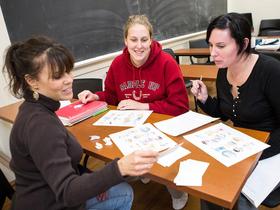The pandemic and post-pandemic era is the time for mid-life career changers making their career moves. Whether due to outsourcing, layoffs or dissatisfaction with their current positions and compensation, people are quitting their old careers. With many more adults deciding to venture into the hallowed halls of higher education today, those who do may find programs geared specifically to their needs. This is particularly true in community colleges, where more than half of the student body may be adults over the age of 22. However, before you launch a career change at your local community college, there are a few tips to keep in mind.
Define Your Goals
Carefully plotting your path is the first step to a successful community college experience, according to Career Search. When embarking on this process, it is important to consider your educational goals, as well as your professional ones. What classes do you need to take, and what degree do you need to earn to make your professional dreams a reality? This information is essential when you choose a school and register for classes, so have the goals in mind before you begin the process.
Jay Shetty suggests that you ask yourself three questions to help set goals.
Weigh Your Options
Community colleges offer a wealth of degree options today, allowing students to hone their career path to a very precise track that brings them the highest possible level of professional satisfaction. Choices abound, but this means you must take the time to research the various options at the schools in your area to find the best academic path for your specific needs. You may also need to determine whether certification, an associate degree or a baccalaureate will get your foot in the door for your next dream job.
Read a Guidebook
It may have been a number of years since you explored the world of higher education, and the environment may have changed considerably since the last time you set foot on a college campus. Prepare for the experience with the help of a guidebook that will give you the facts you need to succeed at college today. “The Community College Career Track: A Guide for High Schoolers, Career-Changers, Parents and Students” is just the ticket. Written by Tom Snyder, president of Ivy Tech Community College, the guide offers practical tips for succeeding at a community college, according to Inside Higher Ed.
Prepare for Placement Examinations
Most community colleges do require incoming students to take placement examinations today. The tests help the school determine whether students need some form of remedial education prior to taking college-level courses. The Huffington Post reports that many schools post sample placement exams on their websites, allowing prospective students the chance to bone up on basic academics like math and writing before taking the exams.
Consider School Choices
Your immediate area may have a number of community college options, so it is important to research each school before applying to one. Colleges tend to specialize in certain areas of study, and some may have partnerships with local businesses that help students get a foot in the door of their chosen industry. Check out the schools through their websites, degree options and even a visit to the campus before settling on the best choice for you.
Check Out the EOC
The U.S. Department of Education Educational Opportunity Center (EOC) offers a number of services to college students. Some of the services include academic and personal counseling, career workshops, and information about financial aid. According to the Huffington Post, there are offices throughout the U.S. college students can contact to find out what might be available.
Explore Transfer Agreements
Many community colleges feature transfer agreements with four-year schools in the area to ensure students wishing to pursue a four-year degree can make a seamless transition from one school to the next. If your career-change may include a baccalaureate degree, it is important to begin your studies at a community college that has such a transfer agreement. This way, you can rest assured the credits you earn at the community college will transfer to the four-year institution.
Practice Time Management
It can be challenging for adult students to balance coursework around family and professional responsibilities. Before you ever enroll in your first college class, have a plan in mind of how you will make time for your studies. If necessary, take a time management course or consider flexible class hours, such as online courses, that make it easier for you to walk the tightrope between your career goals and your current obligations.
This video offers fifteen tips on how to manage your time.
Examine Financial Aid Opportunities
Many adults seeking a career change have lost their current job due to layoffs or outsourcing. If this is you, even the lower tuition rates at a community college can seem out of reach. There are numerous financial aid options for adult students returning to school – as long as you know where to look. According to an article at Monster, nearly half of all community college students receive some type of financial aid. Talk to an advisor at the school you choose about possible financial aid opportunities.
Go For It!
Once you have taken the time to research your options in a school and a degree program, it’s time to take the career-change plunge. The first step on campus may be the hardest, but once you get into a few classes and ramp-up to speed on college coursework, your efforts can reap big rewards. It is never too late to make the career change you have always dreamed about. With a wealth of options available at community colleges today, your next big career step is only a few semesters away.
Questions? Contact us on Facebook. @communitycollegereview















